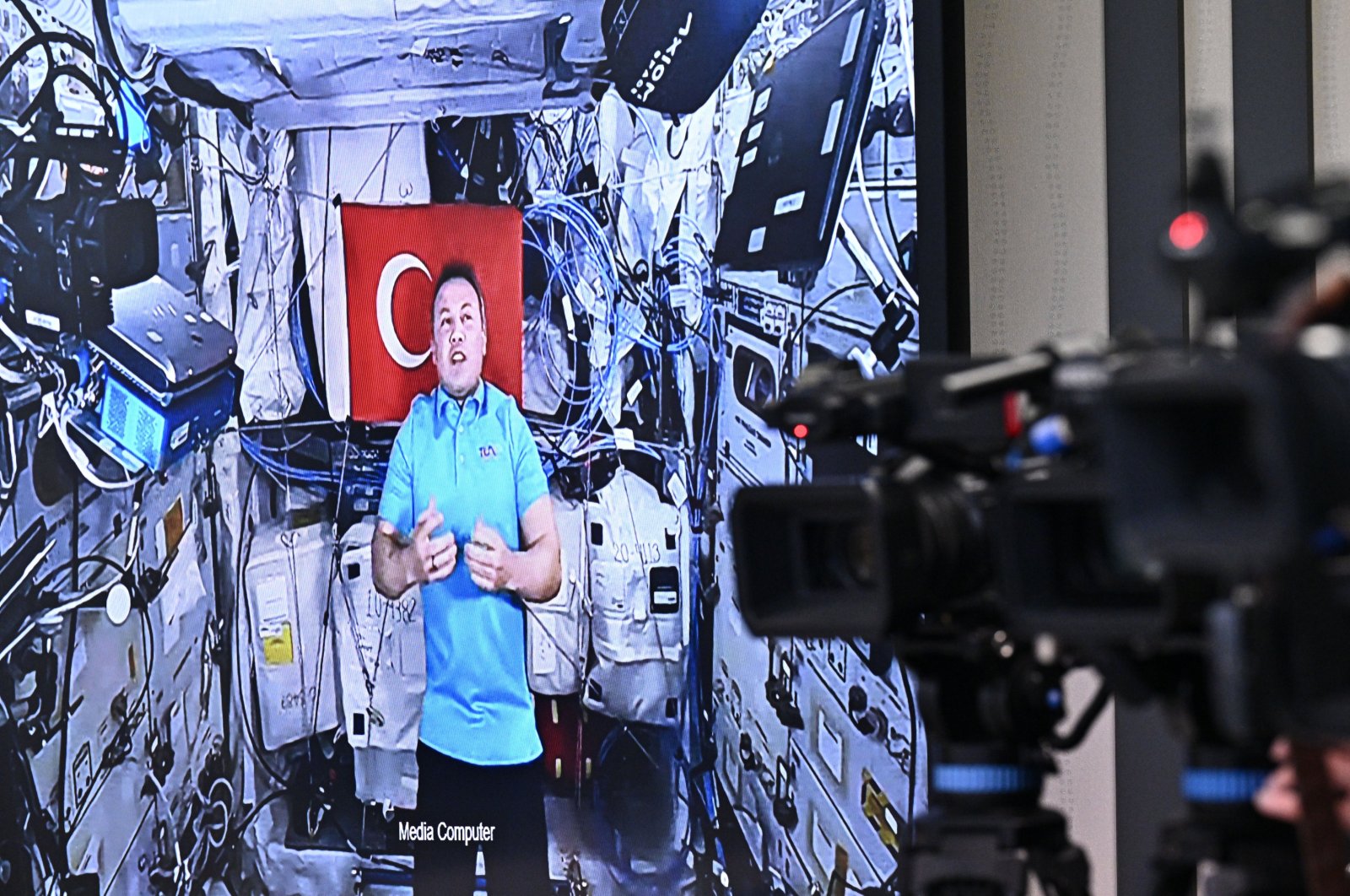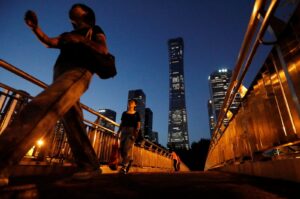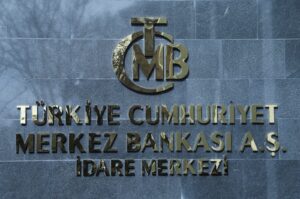Alper Gezeravcı described his feelings about becoming Türkiye’s first astronaut as “something he has never felt before,” and how seeing the Turkish flag on the space station gives him “extraordinary happiness and pride.”
“I am incredibly happy to be a part of this very valuable and important mission in which our country and government have put their will forward, and to be able to carry the dreams of our future generations beyond the sky and into the depths of Space,” Gezeravcı said from the International Space Station (ISS) via video link while responding to questions from journalists at the Turkish Space Agency (TUA) in Ankara on Sunday.
“As for the glorious Turkish flag that I brought here with me, every time I pass by where it hangs, I feel happiness and pride, as it reminds me of the will and determination of my country,” he added.
Gezeravcı is a member of a four-man crew that arrived at the ISS on Jan. 20 for a two-week stay. The Axiom Mission 3 quartet lifted off a day earlier in a rocketship from NASA’s Kennedy Space Center in Cape Canaveral, Florida.
A former fighter pilot and captain for Turkish Airlines, Gezeravcı has been conducting scientific experiments on behalf of universities and scientific centers in Türkiye.
‘Mission transcends imagination’
While he had been a jet pilot for years, Gezeravcı said it was beyond his wildest dreams to serve Türkiye in a field he had never considered until the National Space Program was announced.
The program constitutes Türkiye’s ambitious 10-year space road map, unveiled in early 2021, including missions to the moon and developing internationally viable satellite systems.
Following a selection process worthy of this duty, Gezeravcı learned the requirements for an astronaut to carry out the country’s first manned space mission.
“I received all of the training. I adopted a new way of life tailored to this task, and from that point forward, I was completely channeled into it,” he explained.
He said they received low-pressure ring and centrifuge training to meet the mission’s physiological requirements. While their bodies were subjected to the force of gravity, we developed the physical abilities required to carry out duties.
“We learned how the space station operates normally, as well as how to handle emergencies. We completed theoretical and practical training for the scientific experiments that will be carried out specifically for our mission. We received survival training for emergency scenarios that we may encounter during our return to Earth,” he said.
Possible emergency scenarios
After being strapped into the spacecraft’s chair for launch, Gezeravcı said the time had come for Türkiye to witness the launch, which made him happy.
“The moment of launch was incredible. I was mentally rehearsing the reactions and procedures that we would use in possible emergency scenarios, as we might need this information during the mission and need to be prepared for anything at any time,” he said.
To another question, Gezeravcı noted that the facial area appears more swollen than on Earth due to the accumulation of fluids in the upper parts of the body in the absence of gravity. However, they have special exercise programs to prevent bone density and muscle mass loss.
Some vision problems and immune system weaknesses can occur as a result of the change in pressure in body fluids, though he has not personally experienced this, he said.
“Both Turkish and foreign scientists are constantly researching to understand the effects of living in space on the body and to develop countermeasures against them. In fact, I am conducting some studies and collecting data here on the ISS to contribute to the work of Turkish scientists,” he added.
12 to 15 different tasks daily
Gezeravcı said his life on the ISS is meticulously planned by a team of experts.
Each day begins with a conference at mission control, where he performs 12 to 15 tasks of varying lengths and content. These tasks include scientific experiments from other countries, monitoring of observation points around the world, and responsibilities of “making different broadcast connections such as the connections we make with you, performing our health tests, and taking medical samples.
“In this limited time, I have many scientific experiments and studies to conduct for Turkish scientists, I have to use my time very well and complete all planned activities as we have been preparing for months,” he added.
Missing Turkish cuisine
Gezeravcı emphasized that with the arrival of him and his crew, for the first time in the 25-year history of the ISS, space travelers from so many different countries were on the orbiting station at the same time.
“Currently, we have space travelers from seven countries with nine different nationalities working together, and we do some activities together, for instance, we conduct our experiments alone, but we work together and help each other in some of the video and photo shoots that we send back to Earth. We also get together for meals when we are not working on our planned activities,” he said.
In terms of meals, Gezeravcı said their dietary routine is the same as it was on Earth, and that they chose what they wanted to eat and drink when they arrived at the orbiting station while in the U.S. in April.
“The main criteria for determining food and beverages were to meet the daily calorie target and to eat healthy,” he said.
“The food and beverages we specified were prepared for the duration of our stay on the station and packaged to be transported as cargo before launch, and even before we arrived at the space station, our food was already transported. All these special foods were protected in vacuum packaging during production, so that they remain fresh for long periods, though I still miss the Turkish cuisine,” he added.




















































Be First to Comment